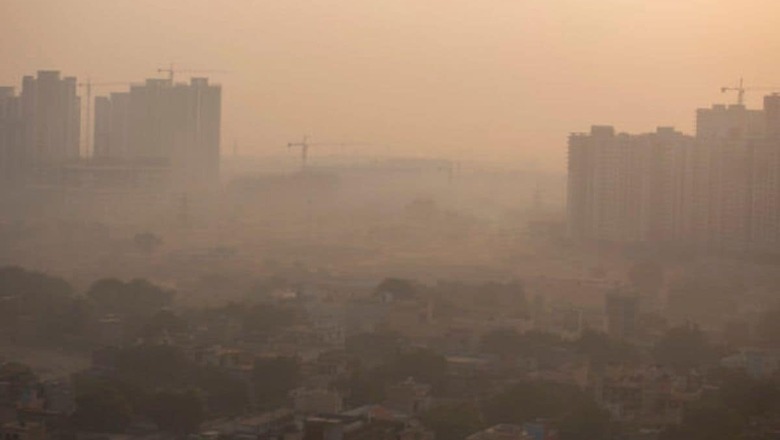
views
Given the rampant exploitation of natural resources, the time has come for a concerted and multi-pronged effort to contain and repair the damages before its too late. When we hack a forest, we do not realise that the process of building the biodiversity back will take ages. What we do is plant a monoculture. Planting of a single species damages the ecosystem due to the removal of natural habitats and cause erosion. Even if a mix of species is planted what about the time, it will take for different species of animals and plants to regenerate their existence.
Treaties, accords and laws are being passed, but the situation is deteriorating rapidly. Though we know solutions, we do not indulge in them. Though we know that ultra-thin plastic below 50 microns is a great biohazard and will cause fatal damages to animals, we still do not ban it. Even if we do bring about the ban, like in some states, we are definitely not enforcing the ban. Your hotel sambar still comes with its idli in piping hot plastic covers only to be later lodged in the gut of some cow or choke up some drain. When we know the source, must we wait for people to change? Can we not plug the source?
The importance of a suitable environment cannot be stressed enough. The Constitution of India under Part IVA (Article 51A- Fundamental Duties) also casts a duty on every citizen of India to protect and improve the natural environment including forests, rivers and wildlife, and to have compassion for living creatures.
However, the greed of mankind has gravely jeopardized the future of the environment. In recent decades, many environmental problems have increased as a result of increased human activities and unplanned management of technological developments. Various human activities have induced many undesirable effects to the environment which are a live threat to human health, economic, natural resources and gene pool of ecosystems, such as pollutions, greenhouse effect, global warming and soil erosion. As a result, the composition of the environment has undergone drastic changes over the years.
Environmental pollution is one of the main reasons why we should fight to protect the environment. Initially, people did not realise the importance of adding a check on the steadily increasing pollution. Their ignorance and negligence have, however, brought irreparable damage to the environment. Air pollution is the biggest environmental risk of our time, costing the global economy $5 trillion every year in welfare costs. Air pollution is also fundamentally altering our climate, with a profound impact on the health of the planet. Individuals, enterprises, communities and governments must come together to explore renewable energy, green technology to improve air quality and endeavour to work responsibly in preserving the environment. Several Environment legislations, like, The Water Act, 1947, Indian Wildlife Protection, Indian Wildlife Protection Act, 1972, Air(Prevention and Control of Pollution) Act of 1981 have been passed to ensure that the harm done to the environment is reduced. Still, they have not yielded the desired results.
Another major challenge confronting the world is global warming. The increase in the global temperature is a direct effect of the pollution that people are suffering now. Besides, several current trends clearly show that global warming is directly impacting the biodiversity and leading to rising sea levels, the melting of ice caps and significant worldwide climate changes.
On the domestic front, our economy is more vulnerable to climate changes and water scarcity. Being an agrarian society, we are largely dependent on Monsoon rains for agriculture, but we do not have adequate facilities to store rainwater. Metro cities, perhaps, are facing the worst water crisis situation- Chennai being a recent example where all water supplying lakes dried up and the government had to bring water to the city via train, to meet the demand.
The Central government’s “Namami Gange Programme” launched in 2014 with a budget outlay of Rs 20,000 crores with a twin objective of decreasing pollution and cleaning the Ganga has a long way to go. The innate hypocrisy of human nature-worshipping the Ganga as a Goddess on the one hand, and on the other, maligning it and showing utter apathy to its cleanliness, exposes the inherent conflict between practices and preaching, what should be done and what is done.
In comparison, Andhra Pradesh is ahead of other states when it comes to dealing with the water crisis. The Andhra Pradesh government has implemented Neeru- Chettu (water-tree) project under its water conservation mission, and its biggest achievement is the linking of the Godavari and Krishna rivers through the Pattiseema project. Also, Jal Biradari that has been committed to water conservation for more than a decade in an informal way has proposed a water literacy program to eradicate water problems in the state by educating people on groundwater and rainfall and making them aware of the gravity of the issue.
However, today’s environmental challenges are increasingly complex. The foremost step that the human race can take now is to prevent any further damage to nature in any form and to live, making substantial use of nature’s resources. Since we cannot magically develop a sense of responsibility towards nature, it is very important to take legal steps to bring about remarkable changes in the environment.
The process of Environment Impact Assessment, introduced in the 1960s to calculate the impact of any major project on the environment and its various components has not been observed properly in India. Lack of advanced technology, insufficiency of data and manipulations in the assessment report has enabled numerous industries/ enterprises to escape legal liability, even in case of violations. The latest erosion of Environmental responsibility is the proposed draft Environmental Impact Assessment (EIA) notification 2020, issued under the powers vested in the Central government under the Environment (Protection) Act, 1986. First, the grant of Post facto approval for projects, as stipulated in the draft notification, goes against the spirit of the legislation, the purpose of which requires governments to take all such measures for protecting and improving the quality of the environment. Second, the proposed notification will encourage environment violations and prove to be severely detrimental to the environment.
The recent lockdown in the country proved to bring some respite to the environment. While human beings felt trapped indoors, mother nature found ways to heal itself amidst the lockdown. This short-lived experience of cleaner air and water certainly offers a long term lesson for the kind of world we want to build after the pandemic.
But truth be told, this climate silver lining will soon fade unless individuals care more for the environment and adopt sustainable practices. Unless each and every individual is aware, only government’s efforts cannot bring the desired difference. Small steps taken at an individual level will go a long way in curbing the environmental crisis. Following on environmental policy of ‘reduce, reuse, recycle’, use of fuel-efficient vehicles, encouraging carpools, planting more trees, saving electricity and water, and the most basic of them, keeping one’s surroundings clean and hygienic are just a few things we can start today to save the environment from destruction.
The life form exists only on Earth, and we do not have any other option yet, to go and live somewhere else. The Environmental crisis is a crisis of our making. If human beings continue to exploit the natural resources at the present rate, sooner or later all life forms will perish. The stakes are staggeringly high, and we must act now before it’s too late.
Disclaimer: Vijaysai Reddy is YSRCP Parliamentary Party Leader, National General Secretary and Rajya Sabha MP.
Read all the Latest News, Breaking News and Coronavirus News here



















Comments
0 comment